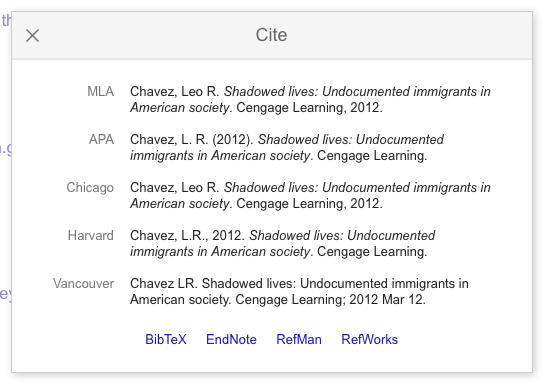3.2 Conducting the Literature Search
3.2.1 Analysis Development
With your research question in-hand (see “Crafting a Research Question”), you will want to follow a semi-structured process for identifying appropriate peer reviewed sources. Document the places you search and the search terms / key words you use in your research log. As you find sources, I recommend keeping track of them in a spreadsheet. This makes it easier to figure out if you have already found and downloaded an article that you may come across multiple times. Dr. Raul Pacheco-Vega website has a great example of a spreadsheet used for tracking literature.
In one sheet of a spreadsheet workbook, keep track of the sources you’ve found, scanned (see “Evaluating Sources”), and found not to be useful. This is to serve as a reference later if you come across an article again and cannot remember if you already looked at it or not. You can easily generate bibliographic citations in Google Scholar by searching for the source and clicking the double quote icon under its Google Scholar entry (highlighted in red):

Clicking that icon should open a pop-up window that includes pre-formatted references in a number of different styles:

I tend to use Chicago, which requires minimal editing for both books and articles to convert the citation to ASA (see “Writing an Annotated Bibliography” for an explanation about why ASA is used). For books, you’ll want to move the year so that is referenced after the author’s name and add the city and state before the publisher’s name. For articles, you’ll want to move the year and simplify the volume and issue numbers.
For sources that you find useful, enter them into a second sheet that includes a citation as well as how you found the article, what the major themes are, any notes you think you need on high-level details about the paper, and cross-references that indicate if the paper is cited by other papers you’ve found. These cross-references are important for making linkages between different aspects of the literature.
3.2.2 Process
I strongly encourage students to follow this general process for identifying appropriate literature:
- Identify appropriate search terms: Based on your research question, what are the keywords that might help you find relevant articles?
- Identify the “state of the art”: Start by searching Annual Review journals (or similar, such as Sociology Compass) for recent articles that summarize the state of the literature in your area. You may not find an exact match, but you may find reviews of related topics. Use these articles to get a sense of what the “state of the art” is for your topic area(s).
- Citations from review articles: Use the review articles you find to identify both seminal publications that define a field of study (may not be recent) as well as more recent empirical studies. Find and download these articles.
- Search other social science publications: Whether or not you find helpful review articles, you will want to also search other key journals. Start with generalist journals and then move to more specific journals focused on particular types of research. Use the same search terms described above. In sociology, for example, the major generalist journals are American Sociological Review, American Journal of Sociology, Social Forces, and Social Problems. In one of my sub-fields, medical sociology, Social Science and Medicine, Journal of Health and Social Behavior, and Health and Place are all key journals.
- Search related journals: Are there journals from other disciplines that are related? If so, search those as well using your search terms. In my research, the American Journal of Public Health and the Annals of the American Association of Geographers are both important journals from related disciplines.
- Search Sociological Abstracts: If you are not finding many citations, you may want to search the Sociological Abstracts database, which catalogs many more sociological journals.
- Iterative Processing of Articles: As you read through the articles you find and download in steps 3 through 7, seek out the studies that they cite that seem related. Download them, read them, and identify more related studies that they cite, then start the process over. Also use this process to identify books. Google Scholar can be instrumental in providing listings of articles that cite a given source.
If you are coming from outside sociology and working on a project that is rooted in your home discipline, you will have to alter the above process to match the key Annual Review journal or journals as well as the other major publication outlets in your field.